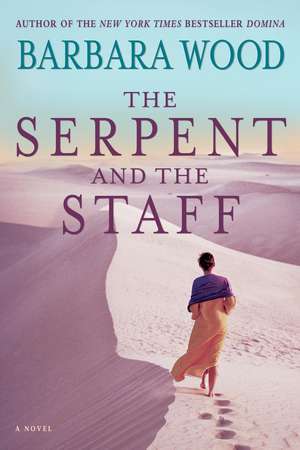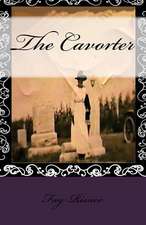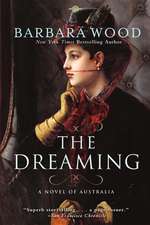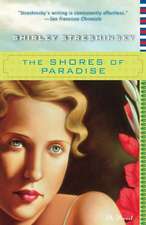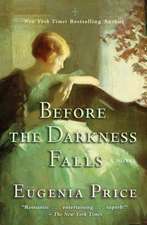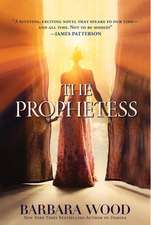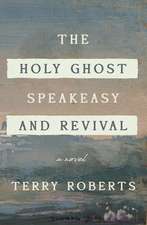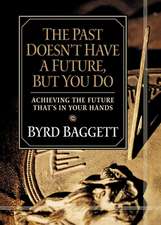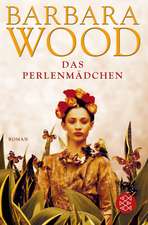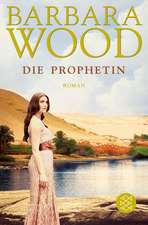The Serpent and the Staff
Autor Barbara Wooden Limba Engleză Hardback – 11 noi 2013
Ugarit, Syria, 1450 B.C.E. Eighteen-year-old Leah, the eldest daughter of a wealthy winemaker, is past the traditional age of betrothal. Vowed to wed the wealthy but cruel shipbuilder Jotham, Leah declines his offer of marriage after discovering that he and his family suffer from “the falling sickness.” Enraged by her refusal and his ruined reputation, he blackmails Leah’s father, a punishment forgiven only by offering Leah’s hand in marriage. With no more options for another suitor and no male heir for her family, Leah must seek out the cure for Jotham’s sickness or her family will face permanent ruin.
During her quest Leah begins to burn with desire for Daveed, the handsome household scribe whose culture forbids their union. Daveed has been called by the gods to restore the Brotherhood, an elite fraternity of guardians at the great Library of Ugarit, rumored to contain the secret symbol of immortality within its ancient archives. If his plan succeeds, it may also save Leah’s family from disaster. But even Daveed and Leah cannot fathom the extent of Jotham’s sinister schemes to make Leah his bride once and for all.
With rich historical detail, The Serpent and the Staff is a sweeping tale of love, betrayal, and how one family's faith can overcome the obstacles that life has in store for them.
During her quest Leah begins to burn with desire for Daveed, the handsome household scribe whose culture forbids their union. Daveed has been called by the gods to restore the Brotherhood, an elite fraternity of guardians at the great Library of Ugarit, rumored to contain the secret symbol of immortality within its ancient archives. If his plan succeeds, it may also save Leah’s family from disaster. But even Daveed and Leah cannot fathom the extent of Jotham’s sinister schemes to make Leah his bride once and for all.
With rich historical detail, The Serpent and the Staff is a sweeping tale of love, betrayal, and how one family's faith can overcome the obstacles that life has in store for them.
| Toate formatele și edițiile | Preț | Express |
|---|---|---|
| Paperback (1) | 130.95 lei 3-5 săpt. | |
| Turner – 27 oct 2014 | 130.95 lei 3-5 săpt. | |
| Hardback (1) | 197.28 lei 6-8 săpt. | |
| Turner Publishing Company – 11 noi 2013 | 197.28 lei 6-8 săpt. |
Preț: 197.28 lei
Nou
Puncte Express: 296
Preț estimativ în valută:
37.75€ • 40.37$ • 31.47£
37.75€ • 40.37$ • 31.47£
Carte tipărită la comandă
Livrare economică 18 aprilie-02 mai
Preluare comenzi: 021 569.72.76
Specificații
ISBN-13: 9781620454619
ISBN-10: 1620454610
Pagini: 389
Dimensiuni: 162 x 234 x 36 mm
Greutate: 0.63 kg
Editura: Turner Publishing Company
ISBN-10: 1620454610
Pagini: 389
Dimensiuni: 162 x 234 x 36 mm
Greutate: 0.63 kg
Editura: Turner Publishing Company
Recenzii
“Wood shows herself a wizard at juggling action and romance, maintaining the momentum and sparkle of both.” —Kirkus Reviews
“Wood makes her fiction come alive with authentic detailing and highly memorable characters.” —Booklist
“Barbara Wood is an entertainer.” —Washington Post Book World
“Wood crafts vivid sketches of women who triumph over destiny.” —Publishers Weekly
“Entertainment fiction at its best.” —Booklist
“Absolutely splendid.” —Cynthia Freeman, New York Times bestselling author
“Wood creates genuine, engaging characters whose stories are fascinating.” —Library Journal
“A master storyteller.” —Tulsa World
“An accomplished storyteller.” —John Jakes, New York Times bestselling author
“[Wood] never fails to leave the reader enthralled.” —Elizabeth Forsythe Hailey, author of A Woman of Independent Means
“Wood makes her fiction come alive with authentic detailing and highly memorable characters.” —Booklist
“Barbara Wood is an entertainer.” —Washington Post Book World
“Wood crafts vivid sketches of women who triumph over destiny.” —Publishers Weekly
“Entertainment fiction at its best.” —Booklist
“Absolutely splendid.” —Cynthia Freeman, New York Times bestselling author
“Wood creates genuine, engaging characters whose stories are fascinating.” —Library Journal
“A master storyteller.” —Tulsa World
“An accomplished storyteller.” —John Jakes, New York Times bestselling author
“[Wood] never fails to leave the reader enthralled.” —Elizabeth Forsythe Hailey, author of A Woman of Independent Means
Notă biografică
BARBARA WOOD is the international bestselling author of 26 acclaimed novels, including New York Times bestseller Domina. Her work has been translated into over 30 languages. Barbara lives in Riverside, California.
Extras
I remember two things about the night Jericho fell.
I remember that I was sixteen years old, and that I was in love.
Thoughts of war were the farthest from my young mind as I tossed and turned in my bed, hearing the sounds of the city beyond my balcony – Jericho on the Jordan River never slept – because I could not put Benjamin’s handsome face from my mind.
I heard distant thunder that night. A spring storm rolling in from the Great Sea, I thought. Black clouds tumbling over the coastal towns, over Jerusalem, soon to quench Jericho’s thirst. Thank the Highest One, I silently prayed. My father’s date groves needed the rain.
He was at that moment in the Temple, offering a fat spring lamb and asking the Most High for relief from the drought. His brother, my uncle, and a physician in high standing, was in the poor quarter where the drought-fever had struck the hardest. He was a familiar sight among the poor, who called
him “beloved healer.”
But my thoughts, on that fateful spring night, could not remain upon the charitable deeds of pious men. Benjamin came into my vision as I closed my eyes and treated myself to his smile, his laugh, his broad shoulders, the way he walked. I was a girl dreaming of marriage. Benjamin was the son of a wealthy family who monopolized Jericho’s rich textile trade. His father was close friends with the King.
We were betrothed.
That evening, Papa had kissed me good night, promising to speak to Benjamin’s father on the matter of the wedding date. It was to be a summer wedding, for there is no luckier time to wed. My life was perfect. My father was one of Jericho’s wealthiest citizens, and my mother the descendent of a king of Syria in the north. We lived in a palatial house with marble pillars within the high walls of a fortified town. Jericho was the safest city in the world, and our house – which was elegant and second only to the King’s palace – stood in the protective shadow of Jericho’s formidable southwest tower from which soldiers had defended the city through the centuries. We had servants and fine furniture, my sisters and I dressed in gowns of the softest wool. We wore gold. We ate off silver plates. And so I saw before me, like a feast laid out on a table, a life of abundance and joy and possibilities.
No girl in the world was happier than I.
The thunder drew nearer, that night, rolling over the western hills. And when I heard shouts and screams in the streets beyond my balcony, I wondered why someone would be afraid of a spring rain.
And then I heard a cry downstairs. A crash. Feet stamping across the polished limestone floor. I flew from my bed to the inner balcony that ran around the inside of the second story of our house. I looked down at the main hall below, where we received guests and held fabulous banquets. My eyes widened in shock as I saw soldiers rudely striding in. They were not wearing the green tunics of Canaanite troops but white kilts, leather breastplates and close-fitting helmets. From their speech, as they shouted orders at the panicked servants, I realized they were Egyptian.
I realized, too, that the thunder I had heard was not the sound of rain coming to Jericho but the rumble of war chariots racing across the plains surrounding the city.
I remember that I was sixteen years old, and that I was in love.
Thoughts of war were the farthest from my young mind as I tossed and turned in my bed, hearing the sounds of the city beyond my balcony – Jericho on the Jordan River never slept – because I could not put Benjamin’s handsome face from my mind.
I heard distant thunder that night. A spring storm rolling in from the Great Sea, I thought. Black clouds tumbling over the coastal towns, over Jerusalem, soon to quench Jericho’s thirst. Thank the Highest One, I silently prayed. My father’s date groves needed the rain.
He was at that moment in the Temple, offering a fat spring lamb and asking the Most High for relief from the drought. His brother, my uncle, and a physician in high standing, was in the poor quarter where the drought-fever had struck the hardest. He was a familiar sight among the poor, who called
him “beloved healer.”
But my thoughts, on that fateful spring night, could not remain upon the charitable deeds of pious men. Benjamin came into my vision as I closed my eyes and treated myself to his smile, his laugh, his broad shoulders, the way he walked. I was a girl dreaming of marriage. Benjamin was the son of a wealthy family who monopolized Jericho’s rich textile trade. His father was close friends with the King.
We were betrothed.
That evening, Papa had kissed me good night, promising to speak to Benjamin’s father on the matter of the wedding date. It was to be a summer wedding, for there is no luckier time to wed. My life was perfect. My father was one of Jericho’s wealthiest citizens, and my mother the descendent of a king of Syria in the north. We lived in a palatial house with marble pillars within the high walls of a fortified town. Jericho was the safest city in the world, and our house – which was elegant and second only to the King’s palace – stood in the protective shadow of Jericho’s formidable southwest tower from which soldiers had defended the city through the centuries. We had servants and fine furniture, my sisters and I dressed in gowns of the softest wool. We wore gold. We ate off silver plates. And so I saw before me, like a feast laid out on a table, a life of abundance and joy and possibilities.
No girl in the world was happier than I.
The thunder drew nearer, that night, rolling over the western hills. And when I heard shouts and screams in the streets beyond my balcony, I wondered why someone would be afraid of a spring rain.
And then I heard a cry downstairs. A crash. Feet stamping across the polished limestone floor. I flew from my bed to the inner balcony that ran around the inside of the second story of our house. I looked down at the main hall below, where we received guests and held fabulous banquets. My eyes widened in shock as I saw soldiers rudely striding in. They were not wearing the green tunics of Canaanite troops but white kilts, leather breastplates and close-fitting helmets. From their speech, as they shouted orders at the panicked servants, I realized they were Egyptian.
I realized, too, that the thunder I had heard was not the sound of rain coming to Jericho but the rumble of war chariots racing across the plains surrounding the city.
Descriere
Set in the tumultuous era when Egypt is on the brink of becoming the dominant world power, The Serpent and the Staff tells the powerful story of a Canaanite family's struggle for survival in a climate of violent change, when cherished beliefs and traditions are threatened.
Ugarit, Syria, 1450 B.C.E. Eighteen-year-old Leah, the eldest daughter of a wealthy winemaker, is past the traditional age of betrothal. Vowed to wed the wealthy but cruel shipbuilder Jotham, Leah declines his offer of marriage after discovering that he and his family suffer from “the falling sickness.” Enraged by her refusal and his ruined reputation, he blackmails Leah’s father, a punishment forgiven only by offering Leah’s hand in marriage. With no more options for another suitor and no male heir for her family, Leah must seek out the cure for Jotham’s sickness or her family will face permanent ruin.
During her quest Leah begins to burn with desire for Daveed, the handsome household scribe whose culture forbids their union. Daveed has been called by the gods to restore the Brotherhood, an elite fraternity of guardians at the great Library of Ugarit, rumored to contain the secret symbol of immortality within its ancient archives. If his plan succeeds, it may also save Leah’s family from disaster. But even Daveed and Leah cannot fathom the extent of Jotham’s sinister schemes to make Leah his bride once and for all.
With rich historical detail, The Serpent and the Staff is a sweeping tale of love, betrayal, and how one family's faith can overcome the obstacles that life has in store for them.
Ugarit, Syria, 1450 B.C.E. Eighteen-year-old Leah, the eldest daughter of a wealthy winemaker, is past the traditional age of betrothal. Vowed to wed the wealthy but cruel shipbuilder Jotham, Leah declines his offer of marriage after discovering that he and his family suffer from “the falling sickness.” Enraged by her refusal and his ruined reputation, he blackmails Leah’s father, a punishment forgiven only by offering Leah’s hand in marriage. With no more options for another suitor and no male heir for her family, Leah must seek out the cure for Jotham’s sickness or her family will face permanent ruin.
During her quest Leah begins to burn with desire for Daveed, the handsome household scribe whose culture forbids their union. Daveed has been called by the gods to restore the Brotherhood, an elite fraternity of guardians at the great Library of Ugarit, rumored to contain the secret symbol of immortality within its ancient archives. If his plan succeeds, it may also save Leah’s family from disaster. But even Daveed and Leah cannot fathom the extent of Jotham’s sinister schemes to make Leah his bride once and for all.
With rich historical detail, The Serpent and the Staff is a sweeping tale of love, betrayal, and how one family's faith can overcome the obstacles that life has in store for them.
